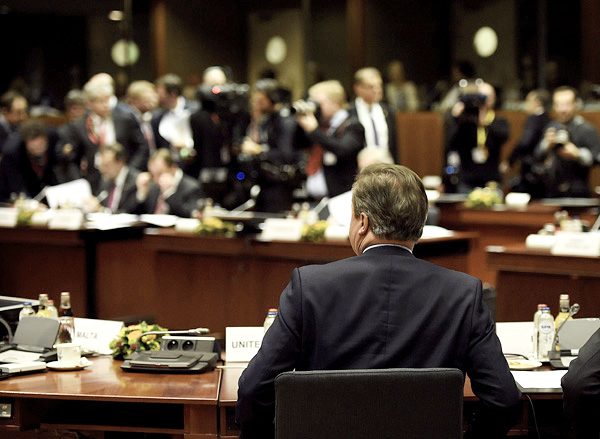Former EU leader: ‘Brexit’ could have ripple effect

British Prime Minister David Cameron sits during a European Union leaders summit, addressing the talks about the so-called Brexit and the migrants crisis in Brussels, Belgium.
LONDON—Britain’s referendum on leaving the European Union is probably the greatest geopolitical issue facing Europe at the moment, said former European Commission President José Manuel Barroso at a symposium on UK-EU relations at King’s College London on April 26.
It is hard to imagine the consequences should the United Kingdom decide to leave, Barroso said, adding that the move could have ripple effects.
In anticipation of the upcoming referendum, the UK government has distributed a pamphlet arguing it is in the best interest of the British people to remain, while reassuring the public that the United Kingdom has secured a “special status” in a reformed European Union.
Barroso said special arrangements have already been made for the United Kingdom and that the governments of other EU member states are willing to accept more accommodations if it means the country will stay. “I think it is a good thing because it allows, hopefully, for Britain to remain in the European Union,” he said.
According to an earlier survey, about 50 percent to 60 percent of the respondents in Ireland, Germany, France, Poland, Sweden and Spain said that any specific changes Britain negotiates with the EU should apply to all member states.
Barroso said it is true that various political forces in Europe are making their points, but so far he has not seen any other government ask for concessions similar to what the United Kingdom is requesting. On the contrary, EU officials have been negotiating and making concessions that are specific to Britain, he observed.
However, those who want the United Kingdom to leave do not think it is enough to be ensured “special status.” MP Bernard Jenkin, chairman of the Public Administration Select Committee, said the UK is still restricted by the Treaty on the European Union, and pays more than its fair share of the EU budget. EU immigrants impact Britain’s social security, putting pressure on social services, like health care, housing and education.
There has been a surge in Euroscepticism due to the euro crisis and the refugee crisis, said former Italian Prime Minister Enrico Letta.
Euroscepticism is not exclusive to the British political scene, said Christian Lequesne, former director of the Center for International Studies and Research (CERI) at Paris Institute of Political Studies. It is a reaction that can be seen among the populace in all the EU member states. Only the degree of opposition and reasons vary, he said, adding that the last five years have seen a shift toward populism in European politics.
In many other countries, such as the Czech Republic, the Netherlands and France, Eurosceptics have demanded a similar referendum on EU membership. The British referendum is emboldening Eurosceptics in other member states, Lequesne warned.
Barroso said that some parties, political forces and people in Europe are xenophobic and opposed to European integration. However, with the exception of the far right, the majority of the European parties do not hold this opinion, he added.
“I hope and I believe that we will be able to overcome these difficulties and that Europe will remain, hopefully, united,” Barroso said. Nevertheless, the European Union is based on free association, and no member is obligated to stay, he said.
According to the most recent public opinion surveys, the majority of the UK public, except for Scotland, does not “feel European,” and the older population are more likely to vote to leave, said John Curtice, professor of politics at the University of Strathclyde.
Lequesne said in countries that were once dominant in history like Britain and France, the past still lingers in people’s minds, even if it does not comport with the reality of the world today. Symbolism and emotion have played a large role in the Eurosceptic debate in the United Kingdom, and to a certain extent, this is the imperial hangover working, Lequesne said, but it is not reflective of British society as a whole.
“I hope the UK will understand that they are no longer at the center of the world. The center of the world is moving toward Asia, and Europe needs a united European Union to remain influential,” Letta said.
Jiang Hong is a reporter at the Chinese Social Sciences Today.
